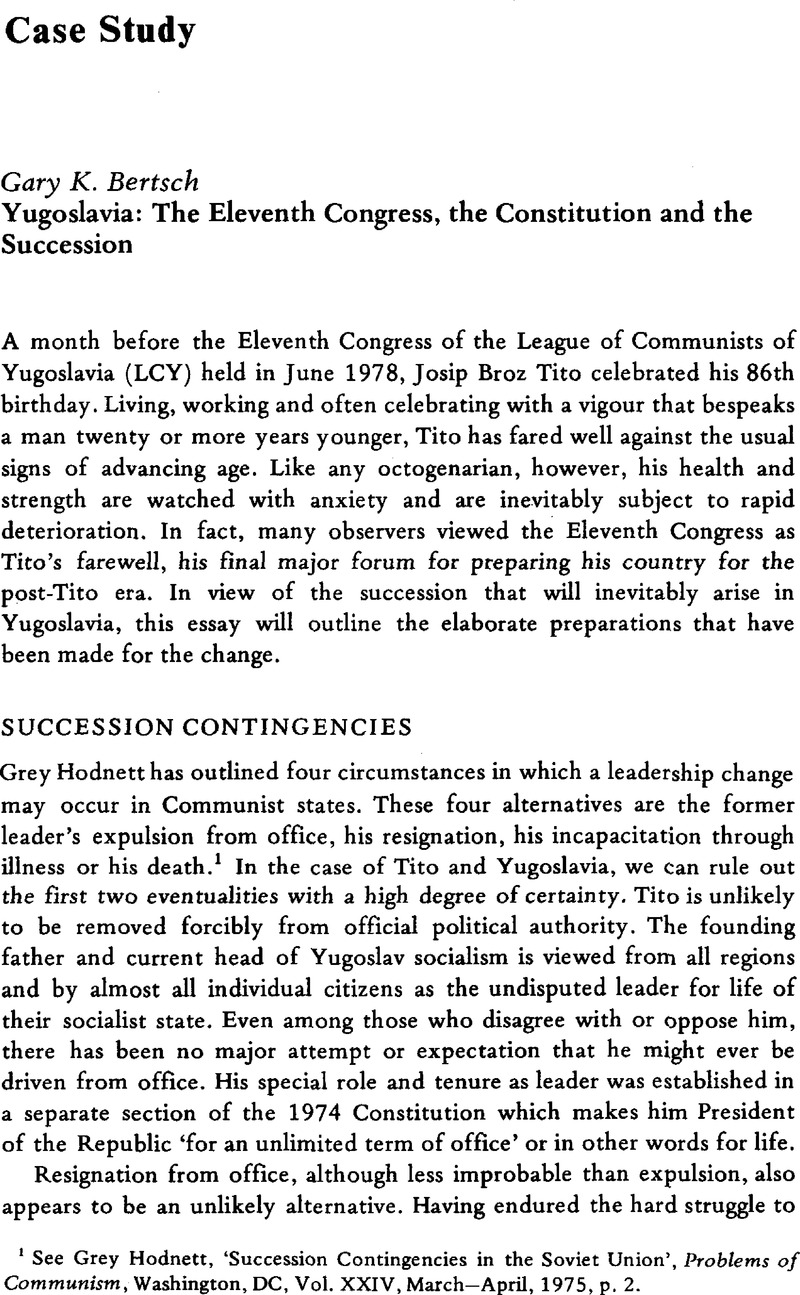Article contents
Yugoslavia: The Eleventh Congress, the Constitution and the Succession
Published online by Cambridge University Press: 28 March 2014
Abstract

- Type
- Case Study
- Information
- Copyright
- Copyright © Government and Opposition Ltd 1979
References
1 See Hodnett, Grey, ‘Succession Contingencies in the Soviet Union’, Problems of Communism, Washington, DC, Vol. XXIV, 03‐04, 1975, p. 2 Google Scholar
2 Kardelj, Edvard, Pravci razvoja političkog sistema socijalističkog samoupravljana (Roads of Development of the Socialist Self‐managing System), Belgrade, Kommunist, 1977, p. 10.Google Scholar
3 See for example, Rush, Myron, How Communist States Change Their Rulers, Ithaca, New York, Cornell University Press, 1974, pp. 223–49Google Scholar; and Zimmerman, William, ‘The Tito Succession and the Evolution of Yugoslav Politics’, Studies in Comparative Communism, Los Angeles, Spring‐Summer, 1976, pp. 62–79.Google Scholar
4 Rankovi was head of the political police (UDBA), a key deputy in the Party, and a close associate of Tito’s. On 16 June 1966 Tito attacked Rankovi before the Executive Committee of the LCY for eavesdropping on top Yugoslav leaders including Tito. Rankovi resigned his posts and was ousted from the LCY shortly afterwards.
5 As the only remaining one of Tito’s closest comrades, Kardelj had the most experience and was the most trusted of all candidates. At the same time, most felt he lacked the ambition, charisma and support required to assume the leading role.
6 See Part Four, Articles 282–397, on the ‘Organization of the Federation’, for a detailed outline of the various bodies, their functions, etc.
7 This attitude is clearly reflected in the large number of Constitutions (4) and many constitutional amendments promulgated in the country’s short life.
8 See, for example, Gilison, Jerome M., ‘New Factors of Stability in Soviet Collective Leadership’, World Politics, Princeton, New Jersey, Vol. 19, 07 1967, pp. 563–81.CrossRefGoogle Scholar
9 For the most part, these individuals represent the old guard of seasoned and powerful leaders who have long been at Tito’s side.
10 See, for example, Rusinow, Dennison I., ‘Yugoslavia’s Return to Leninism’, American University Fieldstaff Reports, Southeast Europe Series, Vol. XXI, No. 1, 1974.Google Scholar
11 Although there is supposed to be a separation between Party and government‐ that is, no one is to hold official functions in both ‐it obviously does not apply to these two important bodies.
12 Ross Johnson, A., Yugoslavia: In the Twilight of Tito, The Washington Papers, Vol. 2, No. 16, Beverly Hills and London, Sage Publications, 1974.Google Scholar
13 In an interview with James Reston on 4 March 1978 Tito denied such a role for the army: ‘We do not think that one day the army could take the administration of the state into its own hands. The army is the force which is called upon to defend the country and only in this sense is it the most important factor’.
- 1
- Cited by


